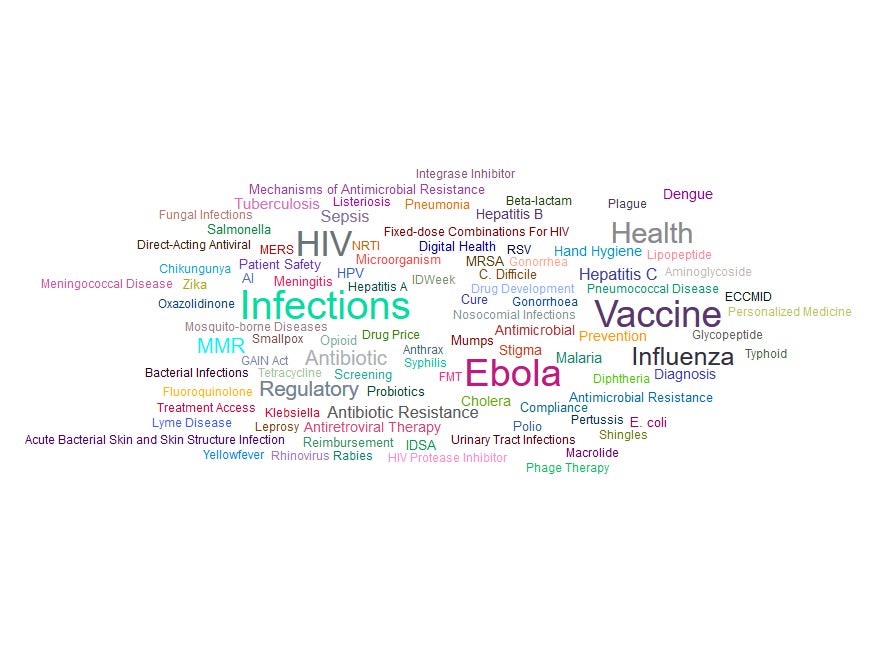
Pharmaceutical Technology lists the top tweeted terms in infectious diseases in August 2019, based on data from GlobalData’s Influencer Platform.
The top tweeted terms are the trending industry discussions happening on Twitter. GlobalData uses proprietary algorithms to analyse key words and key individuals and perform a deeper analysis of what the key individuals in the industry are discussing on Twitter.

Discover B2B Marketing That Performs
Combine business intelligence and editorial excellence to reach engaged professionals across 36 leading media platforms.
1. Ebola – 591 mentions
Ebola is a viral hemorrhagic fever caused by Ebola virus. The virus is believed to be spread to humans through contact with either an infected animal or non-human primate. No approved treatments exist for Ebola currently.
A massive outbreak of Ebola is being reported in the Democratic Republic of the Congo. More than 2,700 cases and 1,800 deaths due to Ebola were reported last month, according to a tweet made by Helen Branswell.
Helen Branswell writes on infectious diseases and global health.
A year ago today the Democratic Republic of the Congo confirmed #Ebola was spreading in northeastern DRC; the start of the country's 10th known Ebola outbreak was declared.
As of Tuesday there have been just over 2700 cases & 1800 deaths. In other words, a massive outbreak. GlobalData Strategic Intelligence
GlobalData Strategic IntelligenceUS Tariffs are shifting - will you react or anticipate?
Don’t let policy changes catch you off guard. Stay proactive with real-time data and expert analysis.
By GlobalData— Helen Branswell (@HelenBranswell) August 1, 2019
2. HIV – 491 mentions
An alarming surge in drug-resistant human immunodeficiency virus (HIV) is being reported, tweeted Carlos del Rio, a Professor of Medicine and co-Director of Emory CFAR.
Further, according to the World Health Organization, HIV’s drug resistance to efavirenz and nevirapine has surpassed acceptable levels in the past four years in 12 countries. Efavirenz is an anti-retroviral, whereas nevirapine is a benzodiazepine non-nucleoside reverse transcriptase inhibitor.
Hugely concerning that in 12 countries in Africa, Asia & the Americas HIV has now surpassed acceptable levels of resistance against 2 crucial #HIV drugs. As with any drug-resistant pathogen, investing in prevention will become more and more critical. https://t.co/uYZDUoe7PB
— Seth Berkley (@GaviSeth) August 2, 2019
3. Influenza – 303 mentions
Three out of the four viruses namely Type A, Type B and Type C cause influenza, also known as flu, to humans.
Annual vaccination is recommended as a safety measure to improve resistance to the infectious disease.
Multiple flu cases and deaths were reported in Australia in August, with huge hospitalisations and outbreaks at retirement facilities.
According to Ian M Mackay, an Australian academician, the severity of influenza in Australia is comparatively lower in 2019.
😷Lab-confirmed #Flu in #Australia to 02AUG2019
⚪ pink line=positives for 2019, other colours=other years
🤧+6,598 new cases added overnight
🤧191,057 cases nationally for 2019 so far
🤧see insets for co-circulating flu viruses & previous year's *total* counts pic.twitter.com/30oNg73H8V— ɪᴀɴ ᴍ ᴍᴀᴄᴋᴀʏ, ᴘʜᴅ 🦠🤧🧬🥼🦟🇦🇺 (@MackayIM) August 1, 2019
4. MMR – 186 mentions
MMR is a vaccine against measles, mumps, and rubella. Global measles outbreaks recorded are at a 13-year high in the first half of 2019, according to a new report by the World Health Organization (WHO).
The UK lost measles-free status in August 2019, and in the US the Centers for Disease Control and Prevention (CDC) reported 1,203 measles cases in 30 states between January and mid-August 2019.
“Losing our ‘#measles-free’ status is a stark reminder of how important it is that every eligible person gets vaccinated" https://t.co/lKUVpnNm9w
— Amesh Adalja (@AmeshAA) August 30, 2019
5. Sepsis – 97 mentions
Sepsis is a chronic condition caused by the body’s response to an infection, resulting in damage to its own tissue and organs. Sepsis causes between six and nine millions deaths a year worldwide.
An estimated one out of three sepsis survivors die a year after discharge from hospital, according to a new study led by researchers from the University of Pittsburgh School of Medicine.
https://twitter.com/AmeshAA/statuses/1159435029300293633




